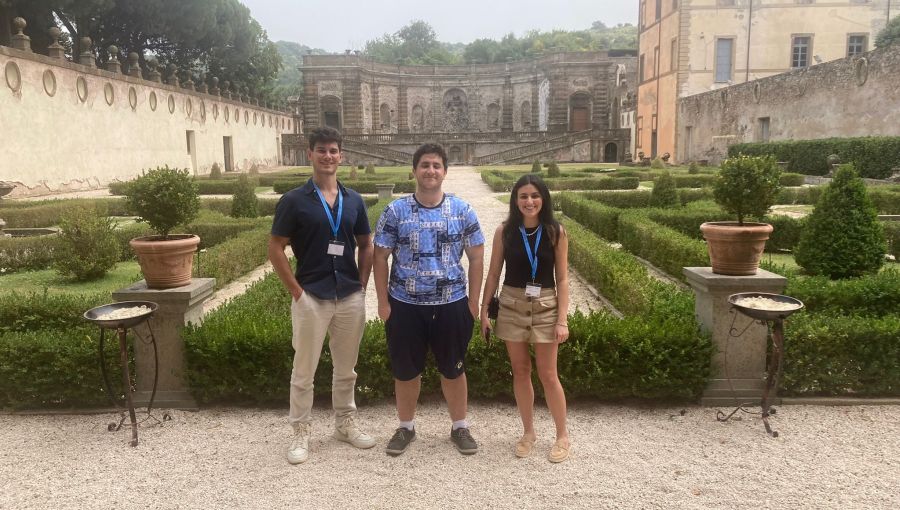Alumnus Dario Diofebi Publishes First Novel Paradise, Nevada
“Diofebi is an irreverent and audacious new voice.”- Susan Choi, National Book Award-Winning author of Trust Exercise
Born and raised in Rome, alumnus Dario Diofebi graduated from La Sapienza University with a laurea triennale and a laurea specialistica in Comparative Literature. In the summer of 2015, Dario did a graduate creative writing workshop at JCU. He then went on to earn an MFA in Creative Writing at New York University. Dario recently published his first novel Paradise, Nevada (Bloomsbury, 2021).
Congratulations on the publication of your novel Paradise, Nevada (Bloomsbury, 2021). Tell us about the story, what inspired it, and the writing process.
Thank you. The book is set in Las Vegas in 2014/2015 and follows the lives of four characters who get involved in a turbulent event at a fictional casino and resort on the Strip. The city of Las Vegas, where I lived on and off for a few years, was an endless source of inspiration. I genuinely love the place, and I felt like the only way I could try to do it justice would be to make the city itself, with all its complexity and contradictions, a central character in the story. Most of the book was written during my two years at the NYU Creative Writing MFA, between September of 2016 and December of 2018. The opportunity to focus entirely on one’s work afforded by Creative Writing programs really is an incredible privilege, and I can’t imagine I would have been able to write Paradise, Nevada without it.
You did a graduate creative writing workshop at JCU in the summer of 2015. What was this experience like?
I was already in Rome visiting my family around the time the workshop started. For some time I’d wanted to write fiction in English, a language I’d learned from books and television, but there was something quite intimidating about trying: it seemed like a creative writing workshop could be the right place to start. The support and encouragement I got from that experience helped me immensely, and the daily practice of writing for class convinced me that this was what I truly wanted to do.
What tips and advice would you give to aspiring writers? How do you deal with writers’ block?
The way publishing works, perhaps inevitably, is that aspiring writers are required to put in years of unpaid work on a book project without any guarantee that it will ever see the light of day. It’s brutal, and it ultimately tips the scale in favor of writers who can afford the wait and persistence, or those lucky enough to get into academic institutions that offer financial support. So I guess the advice would be to find a way to finish your project, to get to the end somehow. And if you can find a network of friends, peers, and teachers to help you, that’s pretty great.
As for writer’s block, I can’t say that I’ve experienced it a lot in the form of lack of ideas or stories to tell, but I do encounter it almost daily in the form of impostor syndrome—feeling I’m not good enough, or that the world really doesn’t need to know my thoughts about stuff. I’m not sure I deal with it very well, to be honest, but I guess I keep writing because I really enjoy stories.
Tell us about a challenge that you encountered in your writing career. How did you overcome it?
Honestly, I’ve been unbelievably lucky at every juncture of my writing career so far. If I have to think of a challenge, the biggest one that comes to mind is the initial hurdle of writing in a foreign language, one I didn’t grow up speaking and only began studying as a teenager. It definitely took some adjusting: I think I initially created a sort of mental patchwork of language from books, movies, TV, and videogames that more or less became “my English prose.” I’ve been working on refining it ever since.
Name three books that you think everyone should read and explain why.
I think people should read whatever they enjoy, I’m not good with required readings. I recently had a great time reading a book that came out last year, Enter the Aardvark, by Jessica Anthony: it’s this short, keenly intelligent, laugh-out-loud novel about taxidermy and a Reagan-worshipping young Republican Congressman. I’ve also been re-reading Zadie Smith’s non-fiction, and you really can’t go wrong there. And then I guess Dickens—does it still make sense to recommend Dickens? Dickens is fun.
What are your plans for the future?
I would like to keep writing. I have a few projects and ideas I find exciting, and I hope I’m lucky enough to be able to work on them more. And teaching—I really enjoy teaching.






